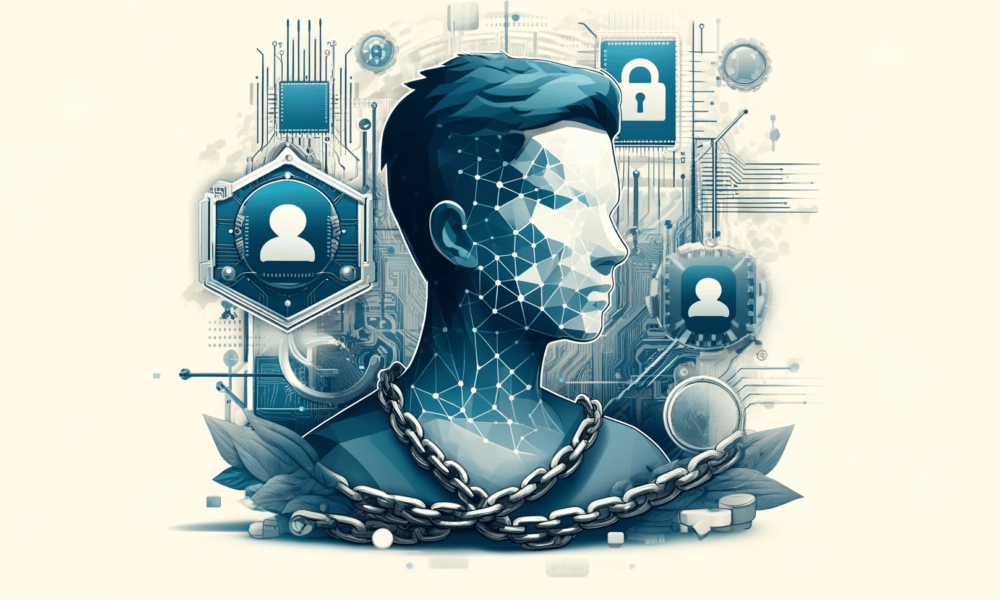Blockchain and Digital Identity in 2024

In the rapidly evolving digital landscape of the 21st century, the issue of identity verification and authentication has become increasingly critical. As more aspects of our lives move online from financial transactions to social interactions the need for a secure and reliable digital identity system has never been more pressing. The advent of blockchain technology promises a transformative solution to these challenges, offering new ways to handle digital identities that could significantly enhance security and privacy.
Blockchain technology, at its core, provides a decentralized and immutable ledger that records transactions in a verifiable and permanent way. This inherent characteristic makes it an ideal foundation for developing a digital identity management system. Unlike traditional systems, which rely on centralized authorities and are susceptible to data breaches, a blockchain-based system distributes data across a network of computers. This not only makes it harder for hackers to compromise the data but also ensures that no single entity has control over the entire identity system.
The Evolution of Digital Identity
The concept of digital identity refers to the unique representation of an individual or entity in the digital realm. Traditionally, digital identities have been managed by centralized entities such as governments, financial institutions, and social media platforms. However, these centralized systems are vulnerable to security breaches, data leaks, and identity theft, posing significant risks to individuals’ privacy and security. As our digital footprints expand and become increasingly integral to our daily lives, the limitations and dangers of these traditional identity management systems have become more pronounced.
Centralized identity management systems store large amounts of personal data in single locations, making them attractive targets for cyberattacks. The consequences of these breaches can be devastating, leading to the loss of sensitive information such as social security numbers, banking details, and personal correspondence. This not only exposes individuals to financial and reputational harm but also erodes trust in the institutions tasked with protecting their data.
Furthermore, centralized systems often involve cumbersome verification processes that can limit user access and exclude those without traditional forms of identification. This reliance on centralized verification also means that users must often relinquish control over their personal information, relying on third parties to manage their identities securely. This setup creates a power imbalance where the user has little control or transparency over how their data is used and shared.
Blockchain Technology: A Game-Changer for Digital Identity
Blockchain technology, the underlying technology behind cryptocurrencies like Bitcoin, has emerged as a potential solution to the challenges of digital identity management. At its core, a blockchain is a decentralized and immutable ledger that records transactions across a network of computers. By leveraging cryptographic algorithms and consensus mechanisms, blockchain technology enables secure, transparent, and tamper-proof record-keeping.
In the context of digital identity, blockchain technology can be used to create self-sovereign identities, where individuals have full control over their personal information and can selectively disclose it to third parties. By storing identity data on a blockchain, users can eliminate the need for centralized intermediaries and reduce the risk of data breaches and identity theft.
The Benefits of Blockchain-Based Digital Identity
The adoption of blockchain technology in the management of digital identities brings a suite of transformative benefits, addressing many of the core challenges associated with traditional identity systems.
1. Security:
Blockchain’s robust security features are paramount. Through the use of encryption, decentralization, and consensus mechanisms, it ensures that identity data is nearly impervious to tampering and theft. Each transaction or modification within the blockchain is confirmed by multiple nodes in the network, making unauthorized data alteration exceptionally difficult. This high level of security is crucial in protecting sensitive personal information against the growing threat of cyberattacks and identity fraud.
2. Privacy:
One of the most compelling advantages of blockchain for digital identities is the enhanced privacy it offers individuals. Unlike traditional systems, where personal data is often centrally stored and managed, blockchain allows individuals to control access to their information. Users can decide what information to share and with whom, using cryptographic keys to grant or restrict access, thereby maintaining privacy and reducing the risk of misuse or unauthorized disclosure of their data.
3. Interoperability:
Blockchain technology excels in facilitating interoperability among various digital identity systems. “This feature enables a user’s digital identity to be portable and widely usable across different platforms and geographic boundaries. Whether accessing government services, banking, or healthcare, users can authenticate themselves seamlessly without needing multiple identities or repeated verification checks.” Says Scott Trachtenberg, CEO of ADA Site Compliance This not only enhances user convenience but also paves the way for a truly global and interconnected service ecosystem.
4. Transparency:
The transparency of blockchain technology is a significant advantage. It records every transaction, including the creation, alteration, and confirmation of digital identities, on a blockchain, providing an unchangeable record that boosts accountability and trust among users, service providers, and regulatory bodies. “Transparency ensures that any interactions with the identity data are noticeable and traceable, which is important in industries that demand strict compliance and regulatory monitoring,” says Ibad Hussain, Head of Marketing at CryptoPie.
5. Cost-Efficiency:
By reducing the dependency on centralized intermediaries, blockchain can significantly lower the costs associated with identity management. Traditional identity verification processes often involve multiple third parties, which can be costly and time-consuming. “Blockchain simplifies these processes by allowing direct, peer-to-peer interactions and automating identity verification through smart contracts. This not only speeds up transactions but also cuts operational costs, making systems more efficient and accessible to a broader population.” Says Robert Bolder, Founder of VPS Server
Challenges and Considerations
While blockchain technology holds great promise for revolutionizing digital identity management, several challenges and considerations must be addressed to fully harness its potential:
1. Scalability:
One of the primary challenges facing blockchain technology in digital identity management is scalability. As blockchain networks expand in size and complexity, they often struggle to process transactions quickly and efficiently. This is particularly problematic for identity verification processes, which require rapid and reliable validations. If not properly managed, these scalability issues can lead to slower transaction times and higher operational costs, undermining the efficiency and user experience that make blockchain attractive.
2. Regulatory Compliance:
The regulatory landscape for digital identities and blockchain is complex and still evolving. Governments and regulatory bodies are grappling with how to apply existing data protection and privacy laws to blockchain technologies, or whether new regulations are needed. Issues such as cross-border data transfer, the right to be forgotten, and the enforceability of smart contracts need clear legal frameworks to ensure compliance and protect all parties involved. Navigating this uncertain regulatory environment is a significant challenge for the adoption and implementation of blockchain-based identity systems.
3. User Adoption:
For blockchain-based digital identity systems to become mainstream, they must gain widespread acceptance among users. This requires not only building trust in the technology’s security and privacy benefits but also ensuring that it is accessible and easy to use. Many potential users lack the technical knowledge needed to manage digital identities on a blockchain, so developing user-friendly interfaces and providing education and awareness about how to use these systems securely is critical for encouraging adoption.
4. Interoperability:
Achieving interoperability between different blockchain networks and existing identity systems poses another significant challenge. Without standards and protocols that enable seamless communication and data exchange across various platforms, the utility of blockchain-based digital identities could be severely limited. Interoperability is crucial for users to be able to authenticate their identity across different services and jurisdictions without redundant verifications. Developing common frameworks and collaborative approaches among blockchain developers, service providers, and regulatory bodies will be essential to overcome these interoperability issues.
The Future of Blockchain and Digital Identity in 2024
Looking ahead to 2024, the convergence of blockchain technology and digital identity is poised to transform the way we manage and authenticate identities online. By leveraging the security, privacy, and efficiency benefits of blockchain technology, individuals can take back control of their digital identities and build a more secure internet ecosystem.
In the coming years, we can expect to see increased adoption of blockchain-based digital identity solutions across various industries, including finance, healthcare, e-commerce, and government services. These solutions will enable seamless and secure identity verification processes, reduce the risk of fraud and identity theft, and empower individuals to protect their privacy and data.
Conclusion
Blockchain technology has the potential to revolutionize digital identity management and build a more secure internet ecosystem by 2024. By enabling self-sovereign identities, enhancing security and privacy, and promoting interoperability and transparency, blockchain-based digital identity solutions offer a promising path forward in the quest for a safer and more trustworthy online environment.
As we navigate the challenges and opportunities of integrating blockchain technology into digital identity management, it is essential for stakeholders, including governments, businesses, and individuals, to collaborate, innovate, and prioritize security and privacy in the design and implementation of digital identity systems. Together, we can harness the transformative power of blockchain technology to create a more secure, inclusive, and resilient digital future for all.





